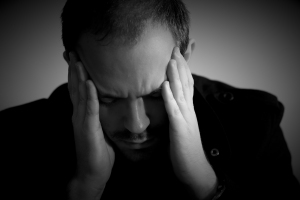
Lawyers are very busy people. They multi-task like a short order cook flipping pancakes in a busy diner. First or second gear is simply not an option.
Speed becomes a large problem for the depressed lawyer. The murky bog of depression short circuits a lawyer’s capacity to move, think and act quickly; everything takes longer and is incredibly more difficult to accomplish. We see our work getting away from us, but are pinned down in a foxhole. Depression is spraying bullets at us as we feel them whizzing by our heads. So we stay stuck in this foxhole, unable to gain traction to meet our daily demands.
I think there’s a couple different ways to look at the lack of productivity in our work; whether it’s due to depression or not. Since you’re reading this blog, your difficulty in pumping out the paperwork is likely due, at least in part, to depression. It may also be that you just don’t like your job, the type of law you practice or are even dream of quitting the profession. What the precise cause or causes are need to be sorted out with a good therapist and wise friends.
For example, is the work slow down due to a neurochemical mix-up in your brain affecting your ability to concentrate? Or, is it a general malaise which suggests that you’re just burnt out and tired of all the bullshit? They’re really different animals.
Depression treatment, because it involves a real impairment in our ability to function as lawyers, must involve care which tries to return us to some normal or pre-depression levels of functioning. I like to imagine it as the ascent of a diving bell to the ocean’s surface.
Burnout, on the other hand, has been defined by experts as situational exhaustion and helplessness that’s usually specific to our job or burdensome task. We’re asked to do work that’s beyond our capacity to get it done. It’s not defined as a psychiatric “illness” per se like depression and usually demands a different kind of healing approach.
But what if we aren’t “technically” depressed, at least not in a clinical sense, or burned out? What if the real spur in our saddle is that we’re just unhappy in our lives as lawyers? We may find ourselves yearning for a greater sense of fulfillment and happiness in our daily lives, but it all seems so illusive. As a result, we keep doing what we already know how to do: put the old nose to the grindstone, try to just survive the blowtorch-like stress and drama and, hopefully, find some semblance of happiness.
Tal Ben-Shahar, Ph.D., a Harvard professor and author of the book “Happier,” says that how we go about searching for happiness is an important part of finding it. He identifies four archetypes – or patterns of behaviors and attitudes – with which we pursue happiness. One of the patterns he identifies is the “Rat Race Archetype.” This pattern of behaviors and attitudes “. . .sacrifices present enjoyment in order to be happy in the future.”
As applied to law students, lawyers and judges, we do well in law school to get that well paying job that requires an eighty-hour work week. We’re supposed to be happy because that’s why we sacrificed so much of our time and energy to get to where we are or want to be. But more often, we find that “the sense of fulfillment disappears, though the drudgery remains,” says Ben-Shehar.
Paradoxically, outsiders may regard the rat-racer as a paragon of success. “Others may even see him/her as a role model for younger children, suggests Ben-Shehar:
“’See, if you work hard, you can be successful like [Bob] too.’” But Bob actually pities these children, but cannot imagine what alternatives there are to the rat race. He does not even know what to tell his children: Not to work hard in school? Not to get good grades? Not to get a good job? Is being successful synonymous with being miserable? Being a hard worker is not the same as being a rat racer; there are supremely happy people who work long hours and dedicate themselves to their schoolwork or to their profession. What differentiates rat racers is their inability to enjoy what they are doing – and their persistent belief that once they reach a certain destination, they will be happy.”
There’s no easy remedy to counter the rat race archetype in the legal profession. Yet, I feel that offering some insight into the problem can lead us to think differently about our predicament. After all, insight is one of the major goals of all psychotherapy. Such insight may even result in our making small or large changes in how we structure our daily law practice. We need to reassess the motivation that is running our lives; the “why” of what we do and not so much the “what.” Lawyers complain about what they have to put up with: the demanding clients, impatient judges, opposing counsel who (we swear!) has it in for us or the Himalayan-like stack of papers on our desk. Yet, we don’t often ask ourselves where this “putting up with” approach is leading to.
Our society rewards doers, especially in the legal profession.
“We learn to focus on the next goal,” say Ben-Shahar, “rather than our present experience and chase the ever-elusive future our entire lives. We are not rewarded for enjoying the journey itself but for the successful completion of a journey. Society rewards results, not processes; arrivals, not journeys. Once we have arrived at our destination, once we attain our goal, we mistake the relief that we feel for happiness. The weightier the burden we carried on our journey, the more powerful and pleasant is our experience of relief. When we mistake these moments of relief for happiness, we reinforce the illusion that simply reaching goals will make us happy. While there is value in relief – it is a pleasant experience and it is real – it should not be mistaken for happiness.”
If our legal life is a series of moments of relief, we will not experience much happiness. I had to learn this one the hard way. I needed to reassess: why was I doing what I was doing? When I was honest with myself, I found that I saw completing my work as, primarily, a source of relief. I had become a very good lawyer, but much of my motivation was spurred on by this motivation; of flopping onto the sofa at the end of the day and thinking, “Thank God that’s over.”
Happiness, in some sense, seemed unrealistic to me before. I now believe that thinking of happiness as unrealistic is a small box view in a big box world of possibilities. We can change our motivation from one of chasing cheese to one of seeing that life happens in the present moment and not some future success. Our life is really a series of moments, isn’t it? And if we bet the house on the American anthem of “no pain, no gain” to obtain some future level of success, we may find that we end up not where we really, truly want to be.

















